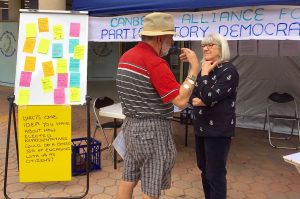Defining the role and responsibilities of MLAs and active community members, and the ongoing dynamic relationship between them
Representing as a two way street
… issues with our democracy go deeper than just how governments and their public servants develop policies, and how they involve citizens in doing that.
Representative democracy requires citizens to delegate the role of “governing” to their elected representatives. But in our increasingly informed and educated electorate, citizens are demanding more, they want to see outcomes improve and they expect to be able to hold their elected representatives to account for that.
Attribution required
- 2020 MLA - Active Community Roles Responsibilities & Relationiships
- 2019 MLA Roles, Responsibility & Accountability
- 2019 MLAs reflect on representing us
- What we learnt at Southfest 2018
- Southfest 2019 - what you said
The 2020 focus for the MLA-RRR group is the ACT election. More details are on the 2020 ACT Election page. We will be running the Candidate Statement exercise again and looking to work with people in Canberra about how to engage the candidates in responding to the invitation to fill in that Statement.
The second, parallel focus is to look at how to better understand the job of an MLA and the complementary role of an active community member. Both are needed for a vibrant democracy. How do MLAs facilitate participation by the community and how can community members engage with the policy formulation and decision making functions of government? To this end we are developing a Statement of MLA Citizen Expectations to open a conversation about how this might happen.
The MLA Roles Action group contributes to awakening democracy by more clearly defining the people’s perspectives on the roles of our elected representatives as a basis for co-designing improved active citizen participation.
MLA Action Group thought for January 2019
Representation is a two-way ongoing dynamic relationship between citizens and representatives through which the self interests of constituents are balanced with our common good by a process of dialogue and deliberation.
2019 Overview
The two broad action areas are:
1. To define the role of MLAs from a citizen perspective, particularly how we expect them to represent and relate to us and how we can hold them to account;
2. To look for innovative methods for improving MLAs capacity for representation and citizens’ capacity to be represented.
Both these lead into preparing for the 2020 ACT Election. As well, the Group will undertake a Candidate Statement exercise with ACT candidates for the 2019 Federal Election.
2019 Current Actions
In early 2019 we are pursuing three strands of work:
- Finalising preparation for the 2019 Federal Election Candidate Statement Exercise
- Conducting a series of semi-structured interviews with all MLAs about their experiences of representing since the 2016 ACT Election
- Organising a series of “focus group/co-design” conversations about roles and responsibilities of representatives to start with a pilot conversation in March.
- To be involved in this, please contact the Secretary.
2019 Key Activity Areas
- To define the role of MLAs from a citizen perspective, particularly how we expect them to represent and relate to us and how we can hold them to account;
- Define the standards, norms and citizen expectations around the roles and responsibilities of our MLAs
- Create a survey to use with citizens to spark a conversation about their expectations
- Pilot that survey at Southfest
- Revise the survey
- Hold a series of public workshops/ focus groups (members and the public) to collect and refine the ideas
- Publicise to promote community conversation
- Refine media strategy — tba
- Define the standards, norms and citizen expectations around the roles and responsibilities of our MLAs
-
- Elucidate MLAs expectations of their representative roles (in parallel)
- Draw out the messages we have collected from the candidate statement and conversations and publicise these:
- Opinion pieces
- Further election candidate statements (2019, 2020) -> see below
- Seek further formal input from MLAs
- Write to MLAs individually either (1) reflecting back on what they committed to and exploring with them how they are approaching this and (2) for those who did not respond, inviting them to reflect on what if anything they have done to improve participation;
- Meet with the MLAs who respond to discuss their responses.
- Draw out the messages we have collected from the candidate statement and conversations and publicise these:
- Do a compare and contrast exercise of citizen and MLA understandings
- Promote community discussion by publicising the differences in understandings
- Use this to feed into the codesigning a new relationship process -> see below
- Elucidate MLAs expectations of their representative roles (in parallel)
- 2019 Federal Election action
- Run a revised Candidate Statement exercise within the ACT in the lead in to the 2019(8) Federal elections
- Publicise these results to promote the message of the need to change how the system might work better
- To look for innovative methods for improving MLAs capacity for representation and citizens’ capacity to be represented
- Deepen our understanding of the landscape of ‘accountability’
- Consider a Roundtable – small technical educational discussion about the theory and practice of accountability
- Explore the range of potential mechanisms for strengthening accountability
- Promote and publicise what we learn widely
- Working with community groups and academics (and maybe MLAs) co-design a new representative model and promote this into the ACT political system
- Deepen our understanding of the landscape of ‘accountability’
- Prepare for the 2020 ACT Election (and beyond)
- Starting in mid 2019
In 2020 we followed up on our 2016 election Candidate Statements by interviewing 15 of our MLAs about what they thought about their role as representatives.
We have reflected on what they told us, and our report on their responses is available here.

SouthFest was a Community Party held in the Tuggeranong Town Centre on 24 November 2018
CAPaD set up a stall at SouthFest. We asked passers-by for their ideas about how elected representatives could do a better job of engaging us as constituents.
In essence people told us:
- They wanted elected representatives to be much more active at the community level, at local venues and in public spaces, to meet local people and hear their issues;
- They wanted their elected representatives to really listen to them;
- They wanted their elected representatives to focus on the public interest and govern for all people.
A summary of the themes that emerged is here.
69 people told us what they thought important attributes of an MLA are. See what they said here.
- Defining the role of MLAs from a citizen perspective
- Define the standards, norms and citizen expectations around the roles and responsibilities of our MLAs
- Elucidate MLAs' expectations of their representative roles (in parallel)
- Do a compare and contrast exercise of citizen and MLA understandings
- Looking for innovative methods
- Deepen our understanding of the landscape of ‘accountability'
- Promote and publicise what we learn widely
- Working with community groups and academics (and maybe MLAs) co-design a new representative model and promote this into the ACT political system
We:
- Analysed the 2016 Candidate statements to inform next steps, prepared an ‘at-a-glance’ and more detailed report, and based our next set of actions on them.
The take-home from this analysis is that our MLAs have a very limited view of what being a representative entails.
- Began planning to assess the MLAs who signed Candidate Statements during the 2016 election campaign, against their Statements.
- Began to widen the conversation to include more citizens and the MLAs (see Southfest notes).

